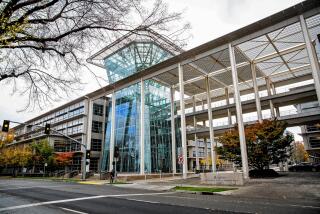Soviets Turn to Beverly Hills Banker for Advice : Economics: U.S. group returns from consultations with Soviet officials. City National expert says an old tax idea could spur transition to free markets.
- Share via
In order to plan their economic future, officials from the Soviet Union are digging deep into the past and turning to the West for guidance.
The reason is simple. In their effort to determine the best way to distribute land as the country moves toward privatization of property, Soviet officials have endorsed a principle that dates back hundreds of years and has been shared by the disparate likes of Leo Tolstoy, Winston Churchill and Thomas Jefferson.
To help them in their economic history lesson, Soviet officials recently invited four U.S. economists and land appraisers to tell them more about a free-market system, including Ted Gwartney, an executive with Beverly Hills-based City National Bank.
The idea several leading Soviet officials have embraced is a longstanding principle to restrict taxes to land only. The theory holds that a heavy assessment on land discourages land speculation and provides the government with a steady source of income. And by not placing the tax burden on manufactured goods, the system would increase the amount of money people have to spend on goods and services.
The theory is often attributed to Henry George, a 19th-Century economist who favored a single tax on land, accompanied by the elimination of all other taxes. But in fact, the idea has had supporters for hundreds of years, and, in fact, was in place in Russia prior to the 1917 Bolshevik revolution.
“The basic principle is that the Soviets now believe in a free-market economy, and this is the best way for them to move rapidly in that direction,” said Gwartney, an expert in land appraisal. “It is also the soundest way of dealing with the land distribution problem the Soviets face and the fastest way of putting them on the path of economic prosperity.”
Gwartney and three other economists--Nicolaus Tideman, George Collins and Steven Cord--spent two weeks meeting with officials in Moscow, Leningrad and the Republic of Estonia outlining the land-tax model. The group was invited after attending an economic symposium in New York City last August at which financial leaders across the country met to discuss the Soviet Union’s political and economic reforms.
Gwartney said the biggest surprise of the recent trip was seeing the Soviets’ desire to rapidly move from a socialist system to a free-market economy after almost 75 years of Communist rule.
“The whole time we were there, nobody ever questioned the free-market system,” Gwartney said. “They’re absolutely committed to it at this point, and I don’t see how it could be stopped.”
The U.S. group met with members of the Supreme Soviet of the Republic of Estonia, the City Council committee in Moscow and officials from four of the seven national institutes responsible for planning, architecture and land distribution in the Soviet Union.
Gwartney, who was there to help the Soviets set up a model for appraising land, said some of the republics have already started turning over property to private hands. He said Estonia, for example, has given back more than 4,500 farms to relatives of families who were the original homesteaders.
However, Gwartney added that the movement to privatize land will be slow, especially while the Soviet Union is staggering under a crumbling economy.
This week, at a gathering of the world’s wealthiest nations in Paris, officials warned Soviet President Mikhail S. Gorbachev that he must produce a concrete program to turn his economy from central planning to free-market principles before they will discuss a massive aid package he wants.
“They still must come up with some kind of monetary policy there,” Gwartney said. “They do not have a history of land sales or income data, and it’s a prime problem for a country that is trying to adopt a whole new economic system.”
More to Read
Inside the business of entertainment
The Wide Shot brings you news, analysis and insights on everything from streaming wars to production — and what it all means for the future.
You may occasionally receive promotional content from the Los Angeles Times.








